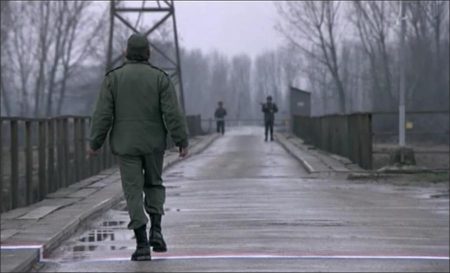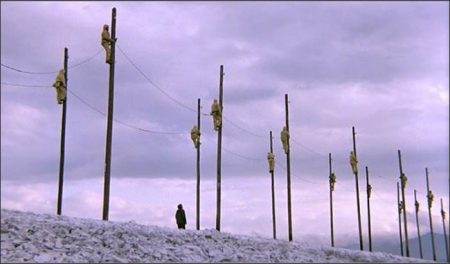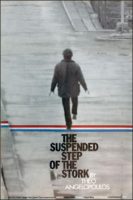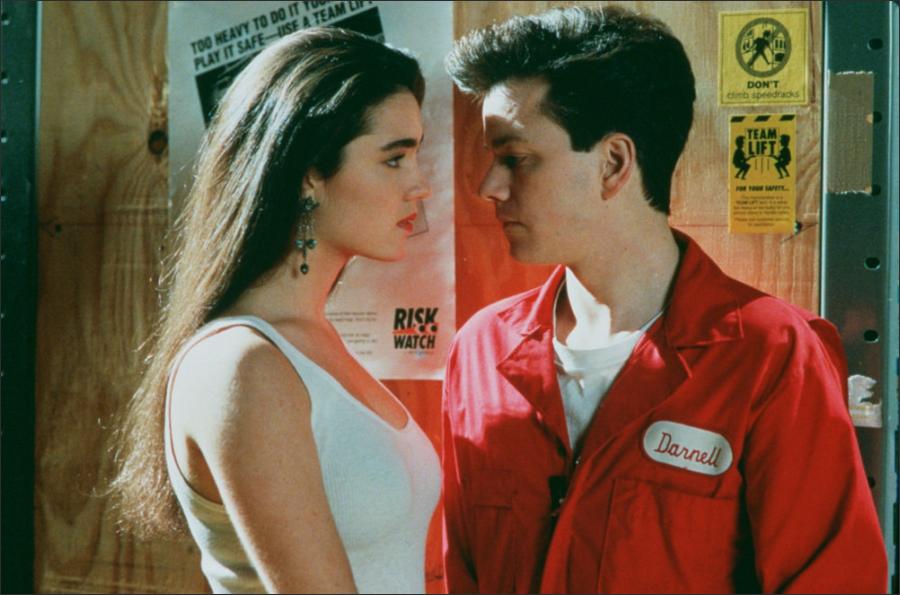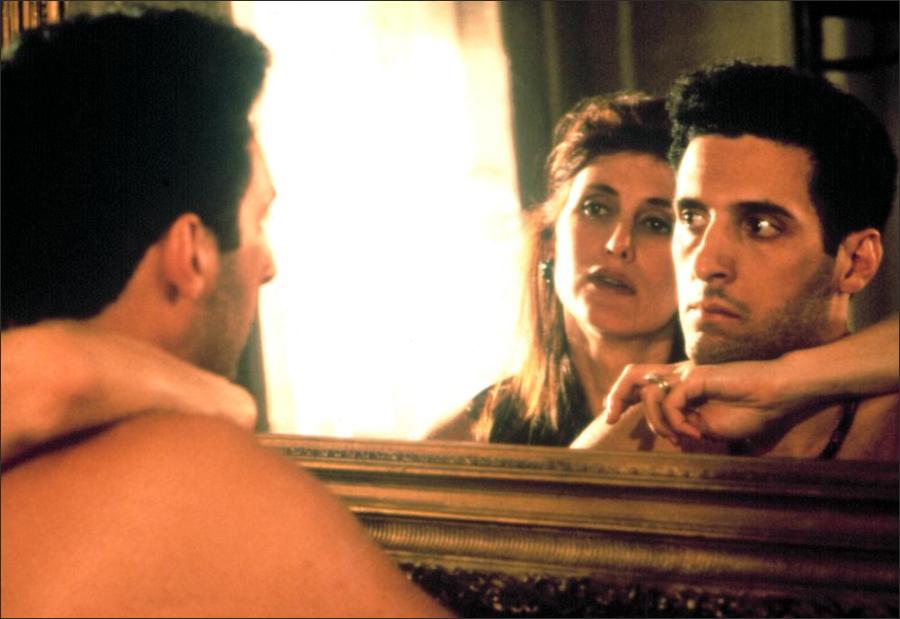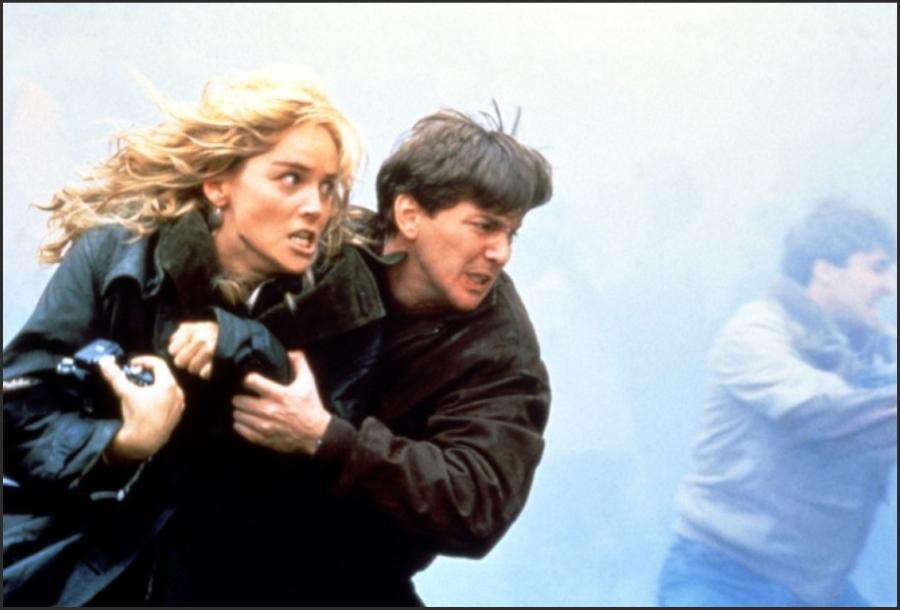The Suspended Step of the Stork movie storyline. Alexandre, a TV reporter, is working for a few days in a border town, where a lot of refugees from Albania, Turkey and Kurdistan are packed in. Among them, he notices an old man and thinks he is an important Greek politician who disappeared mysteriously a few years ago. Back in Athens, he asks this politician’s former wife to come and identify him. A slow and dry meditation about inhumanity of borders.
The Suspended Step of the Stork (Greek: Το Mετέωρο Bήμα Tου Πελαργού, translit. To Meteoro Vima Tou Pelargou) is a 1991 Greek film directed by Theodoros Angelopoulos. The film is starred by Jeanne Moreau, Marcello Mastroianni, Gregory Patrikareas, Gerasimos Skiadaresis, Christoforos Nezer, Dimitris Poulikakos, Ilias Logothetis and Dora Hrisikou. It was entered into the 1991 Cannes Film Festival.
About the Film
The Suspended Step of the Stork marks an important moment in the career of Greece’s preeminent auteur, Theo Angelopoulos (1935-2012). This is the film in which he solidified his measured mise-en-scène, long take, long shot style, four years before his most famous International success, Ulysses’ Gaze (1995).
Yet Angelopoulos, whose every film contains isolated moments of visual sophistication, remains, in my mind, a notch below the great artists to whom he bears some superficial resemblance and who he has gone on record as saying have influenced him: Andrei Tarkovsky, Orson Welles, Kenji Mizoguchi, Michelangelo Antonioni, and Miklos Jançso. Although his films employ a similar rigorous formal control as some of these directors, his films do not consistently stir emotions and create magic in the sense of these artists. David Bordwell may have said it best in his book Figures Traced in Light (2005), when he wrote that he sees him “as more a synthesizer than an innovator.” (pg. 141)
The Suspended Step of the Stork bears the stamp, interestingly enough, of Tonino Guerra, an Italian screenwriter with an impressive track record. One can make a case for Guerra as an auteur in that he has written a large number of films where the emphasis is not on narrative, but on a metaphysical/spiritual quest or voyage: L’Avventura, La Notte, Identificazione di una donna, Deserto Rosso, Zabriskie Point (Antonioni), Nostalghia (Tarkovsky), Landscapes in the Mist, The Suspended Step of the Stork (Angelopolous).
With Stork, we have a poetic treatment of one of the 20th century’s most powerful social and political images: the border (or frontier). And Angelopolous treats it in one of the world’s most complicated regions, the Balkans, where geographical, political, and religious divisions run as far back as the Ottoman Empire (1300-1922), and continue to this day (as treated by Alain Chouinard in his essay in this issue).
The “border” here is that separating Albania from Greece, although Angelopoulos also treats it in a figurative sense (the border separating the present from the past, separating aspects of one’s own identity, as in the case of Marcello Mastroianni’s character). The titular step comes from two bookend scenes. In the first, a Greek colonel walks along a bridge linking the two countries and stops right at the frontier line.
In the distance we see rifle-toting Albanian guards. The colonel holds his right foot in the air hovering above the line. He says, “Greece ends at the blue line. If I take one more step I will be somewhere else, or die.” At the end of the film the Greek television reporter repeats this gesture (as does the symbolic journey, which both the mythical Ulysses figure played by Marcello Mastroianni and the journalist take). This sense of repetition, of history repeating itself and the journey commencing once again, is, in one sense, also the film’s source of hope.
The Suspended Step of the Stork (1991)
Directed by: Theo Angelopoulos
Starring: Jeanne Moreau, Marcello Mastroianni, Gregory Patrikareas, Gerasimos Skiadaresis, Christoforos Nezer, Dimitris Poulikakos, Ilias Logothetis, Dora Hrisikou
Screenplay by: Theo Angelopoulos, Tonino Guerra,
Production Design by: Robert Boyle
Cinematography by: Giorgos Arvanitis, Andreas Sinanos
Film Editing by: Yannis Tsitsopoulos
Costume Design by: Giorgos Patsas, Rita Riggs
Art Direction by: Mikes Karapiperis
Music by: Eleni Karaindrou
Distributed by: 2001 Audiovisuel, Forum Distribution (France)
Release Date: December 4, 1991
Hits: 106
